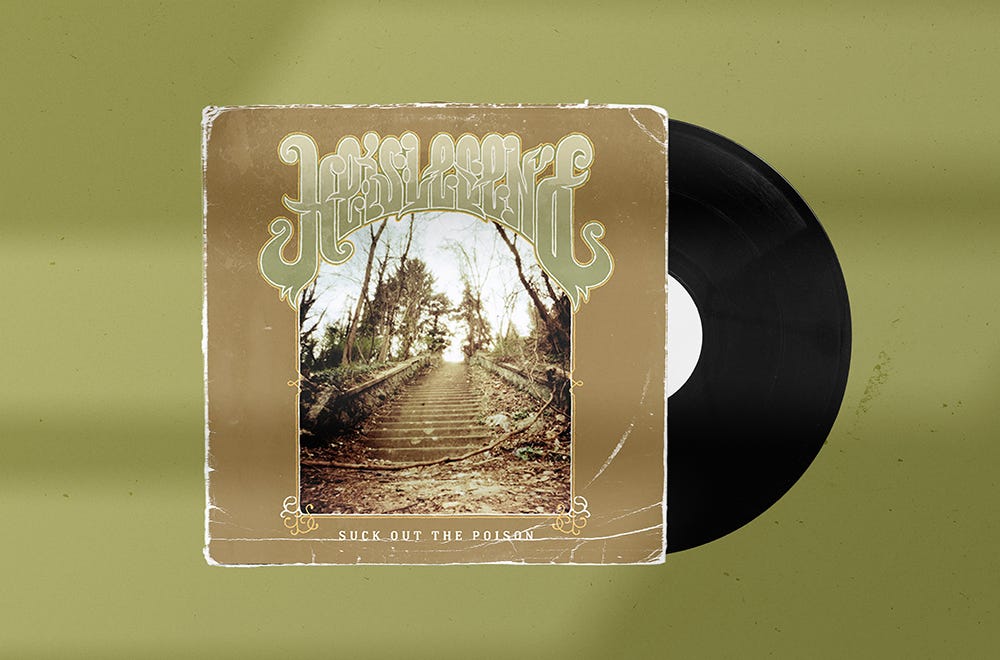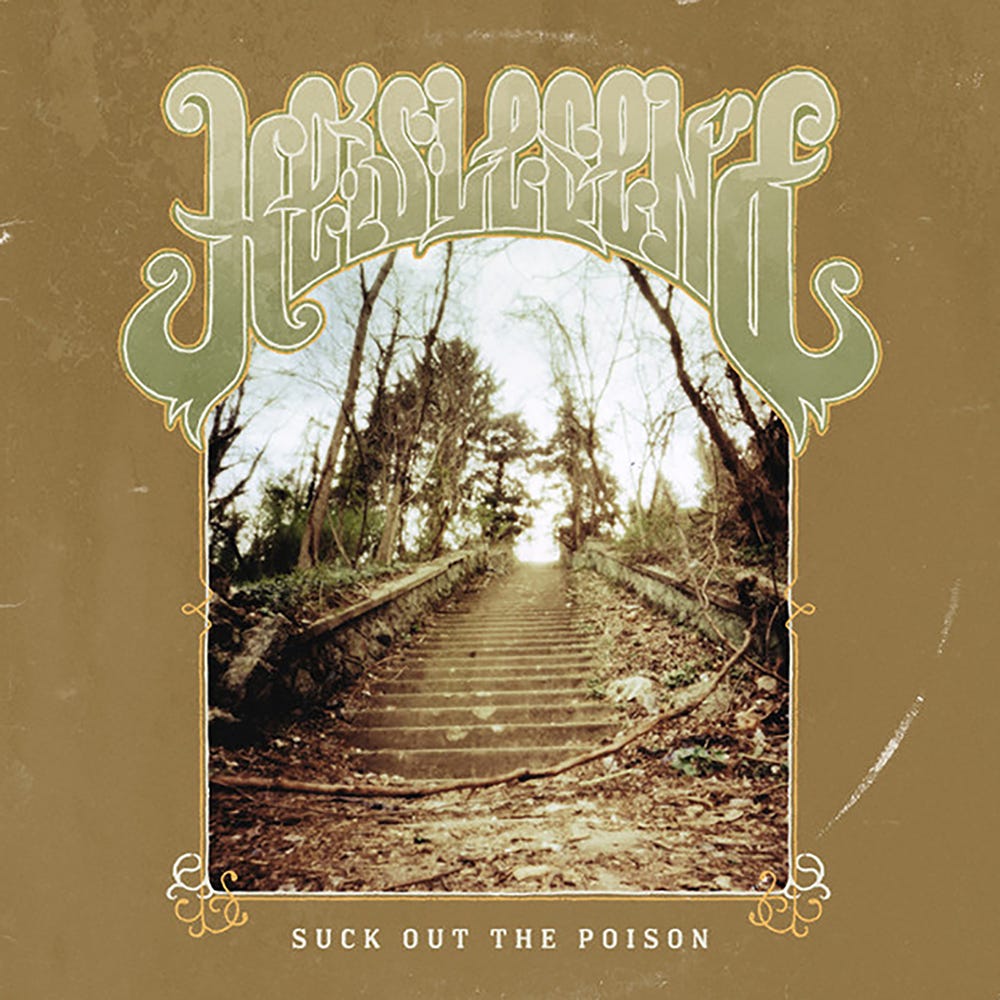Deep Cuts #12: He Is Legend – 'Suck Out The Poison'
Hard rocking fairy tales of evil maidens and epic battles from the Dirty South.
Artist: He Is Legend
Title: Suck Out The Poison
Release: October 3rd, 2006
Label: Solid State Records/Century Media Records
Listen here: Spotify | Youtube
Like most subgenre descriptors born of the Internet and/or lazy music journalism, ‘Southern metalcore’ is admittedly a bit of a head-scratcher. While the term has ostensibly come to represent metalcore acts with a stylistic flair for incorporating the ‘Southern rock’-isms of the American South—that is, disparate elements of hard rock (or ‘butt rock’ to its detractors), country, sludge, psych and folk—it’s not exactly a geographically consistent moniker.
For one thing, one of the subgenre’s longstanding trailblazers, Every Time I Die (RIP), are from the cold winter clime of Buffalo, New York. To me (an Aussie), that’s practically Canadian. Better still, acts like Dead and Divine and Cancer Bats are actually Canadian, Vanna originated in Massachusetts, and Australia’s own regional scene has had more than a few earnest wannabes.
Thankfully, there’s one band of this ilk that’s managed to rise above such labels by fully embodying their Southern roots and daring to reach new creative heights in the process. And that band is Wilmington, North Carolina’s very own He Is Legend.
Suck Out The Poison, the band’s 2006 sophomore record, wastes little time in letting the listener know what’s up.
“Dixie Wolf (The Seduction Of...)” kicks off with drummer Steve Bache’s punchy rhythms and the down-tuned, twin-guitar twang of guitarists Adam Tanbouz and McKenzie Bell. As the furious riff progression hits a stop, Matty Williams fills the track’s dynamic range with a thick, rumbling bass tone before vocalist and frontman Schuylar (that’s ‘SKY-LAR’) Croom’s gravelly croon rolls seductively into the first verse:
“I thought you knew me but it seems you never did/
I tried to find you in the castle where you hid.
I took the pictures that you ruined from my wall/
No one remembered me I was right after all.”
With this subtle nod to ruinous magic realism, the track launches into a triumphant chorus section dressed up by Tanbouz’s playful leads. As Croom sings of villains and princesses, calling out the fairy tale by the name itself, his vocal performance suddenly turns on a dime and his monstrous side is revealed with a powerful guttural scream: “Rest in pieces!” For 2006, this was the He Is Legend fans knew and loved—almost. Well, not quite.
Suck Out The Poison would end up being the first of many ambitious sonic departures for the group across their near-twenty-year career, as they faithfully embraced a more dynamic and versatile sound steeped in hard rock lore and gothic trappings.
In the music business, change isn’t an option—it’s a fact of life. The mid-00s were no different, representing a formative period of significant upheaval for groups coming out of their previously insular and now burgeoning mainstream scenes. More eyeballs meant new expectations and more pressure to perform. So, how did He Is Legend approach this shift? Well, short answer: they didn’t. Not consciously anyway.
“There was no decision,” Croom says in a 2007 interview with Death Before Dishonour magazine. “Our sound has always changed from album to album. This is just the first time we didn’t change the name of the band with the sound change.”
It’s this sense of confidence and fluidity in their own skin that lends He Is Legend their dynamic edge. While early releases like the 91025 EP and their debut album I Am Hollywood sported brutal screams and superfluous breakdowns, there was always a strong melodic undercurrent to the band’s compositions.
Although many of the bands they toured with in the metalcore/post-hardcore hey-day of the mid-00s only played at doing a ‘rock album’ or an off-kilter stylistic shift, He Is Legend never had to fight that urge because it was already sewn into the fabric of their sonic DNA. They weathered the fairweather seasonal winds by doing what they do best: whatever the fuck they want. Croom continues:
“I guess that is what we pride ourselves on: we are a kick-ass live band and we do what we do to the best of our ability. Of course, we get lumped into the hardcore scene a lot because our music is heavy, and because of the record label that we’re on, but we look at ourselves as more of a rock ‘n’ roll band.”
Tracks like the swirling “Mushroom River,” “China White II” and the record’s quicksilver title track showcase this traditional rock ‘n’ roll tendency in real-time. Croom’s vocal performance effortlessly flits from slippery to savage, accenting Tanbouz’s solos and the group’s rhythmic lock-step with his lofty high notes and layered demonic shrieks.
Find another band of the time that could write a breakdown section as concussive and captivating as the “Little pig, little pig” refrain in the stomping “Serpent Sickness,” or weave an epic story of witchy resurrection into a full-blown Southern gothic barnburner like “Electronic Throat.”
For Croom, who grew up in a rigid Baptist household where signs of horror, terror and the occult were strictly off-limits, Suck Out The Poison was both an act of defiance and divination; a way to suck out the poison from our cultural consciousness before spitting back it out over delightfully dark and entrancing compositions.
As the frontman describes in the band’s now-archived Solid State Records bio:
“The world that exists on the road is as real as anything in my imagination. What’s the difference between a story about a man living inside a woman’s head and the fleeting events of everyday life on tour? The visions I see in these songs are pictures of my home—the road. Losing all you know of comfort and reality is what this record is about.
It’s not just a collection of songs, but a visit to my abode, my dwelling place. And in that dwelling place, you may find a man with flowers growing out of his hands, or you might find a widow mourning the loss of her sailor husband—who has just been devoured by a whale while at sea. Whether it’s a witch who stole the moon or a wife that was made from a corpse, every song is a methodical, magical, mystical masterpiece.”
Album deep cut (and my own personal favourite) “The Widow Of Magnolia” channels Croom’s siren song into a masterclass of weaponised aggression and narrative storytelling.
With a crunchy, straight-forward intro, the track quickly charges into kinetic verses, amply directed by Tanbouz and Bell’s thick-and-fast fretwork. Croom’s chorus turns on aching loss and preemptive mourning (“Magnolia/ I’ll be coming home/ I’ll be coming home/ Real soon”), describing a lament for someone the narrator desperately wishes to see again.
However, all hope is quickly dashed, as the intro breakdown returns once more, but this time it’s slower, heavier, and all the more crushing, imposing itself upon the listener like the angry face of a 100-year wave. Against the track’s hypnotic tidal pull, the listener is marooned and hopeless. Sucked into the fading notes of the band’s sonic squall, where we all await the bitter solitude of a sailor’s grave.
While Bell would eventually leave the band shortly after the release of Suck Out The Poison (and sadly pass away in 2020; RIP), the creative core of the group—Croom, Tanbouz and Williams—have always maintained a distinct and pronounced consistency in their approach to songwriting, something which has garnered them a passionate and devoted fanbase (myself included). As Croom explained in our 2017 interview:
“We certainly have a cult following. Of course, we didn’t sell out this room in Glasgow tonight, but the kids that were here were fucking stoked, you know? So, to us, it’s really important to notice that silver lining. … [W]e’re coming up on this new movement of our band, gaining new fans and it’s important for us to remain positive throughout this whole thing. Ultimately, we owe it to these influences that shine through regardless, and I think our sound now is nailed down and pinpointed.”
In looking back at the He Is Legend catalogue, it’s remarkable just how diverse the band’s sound has become over two decades. Whether it’s the spasmodic, art-rock flirtations of I Hate You (2009), the towering melodies of the massively underrated Heavy Fruit (2014), or their career-best performance on the super catchy White Bat (2019).
As I wrote in my review for the band’s 2017 album, few, it’s this fearless creative vision that has led to He Is Legend being well-respected within the heavy music community. In a feature for Alternative Press, Underoath vocalist Spencer Chamberlain remarked:
“There’s a handful of bands out there, that when I hear their record, I wish that I wrote it… He Is Legend have always been one of those bands.”
You can now find all of the albums featured in this series in the TPD // Deep Cuts playlist on Spotify.








